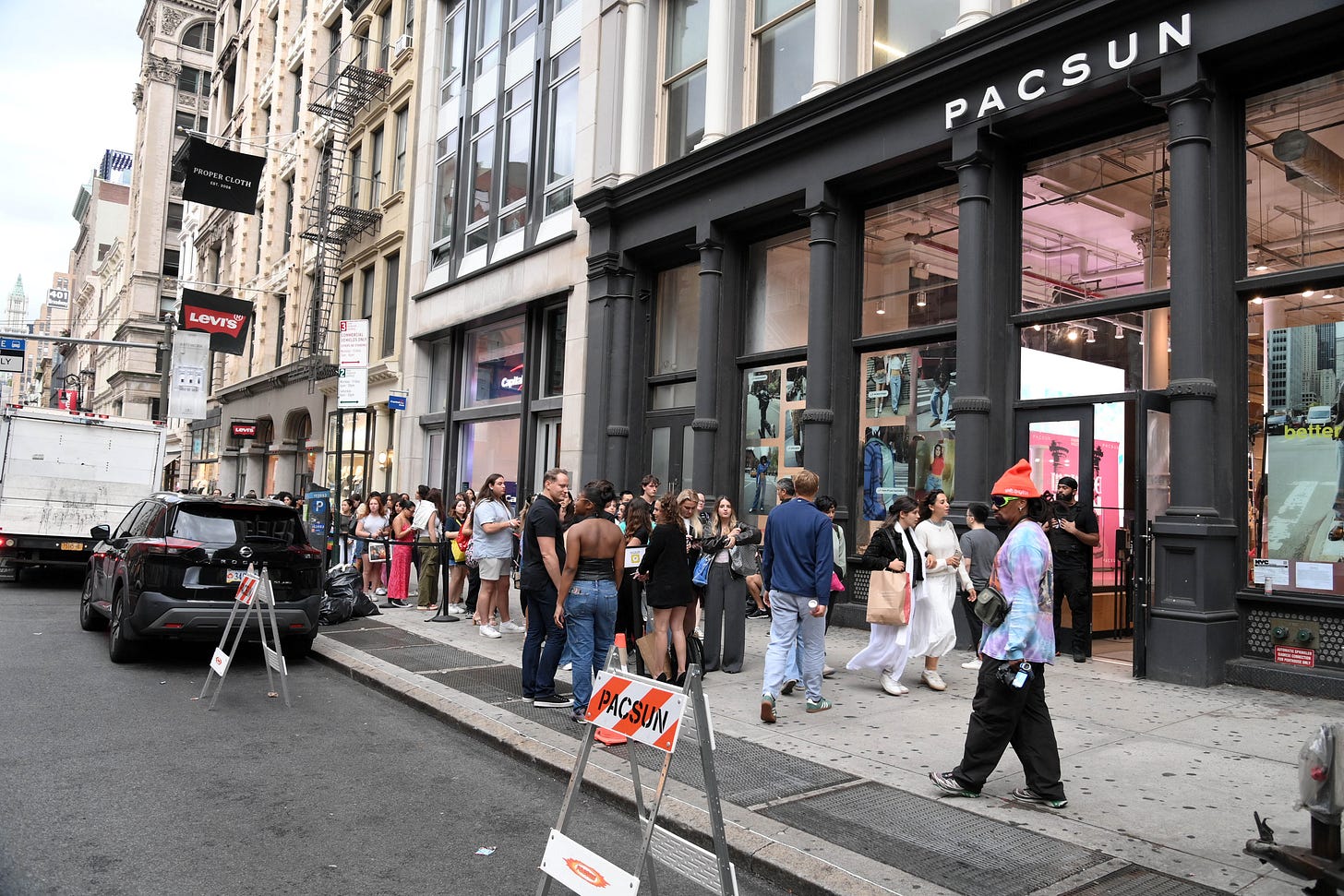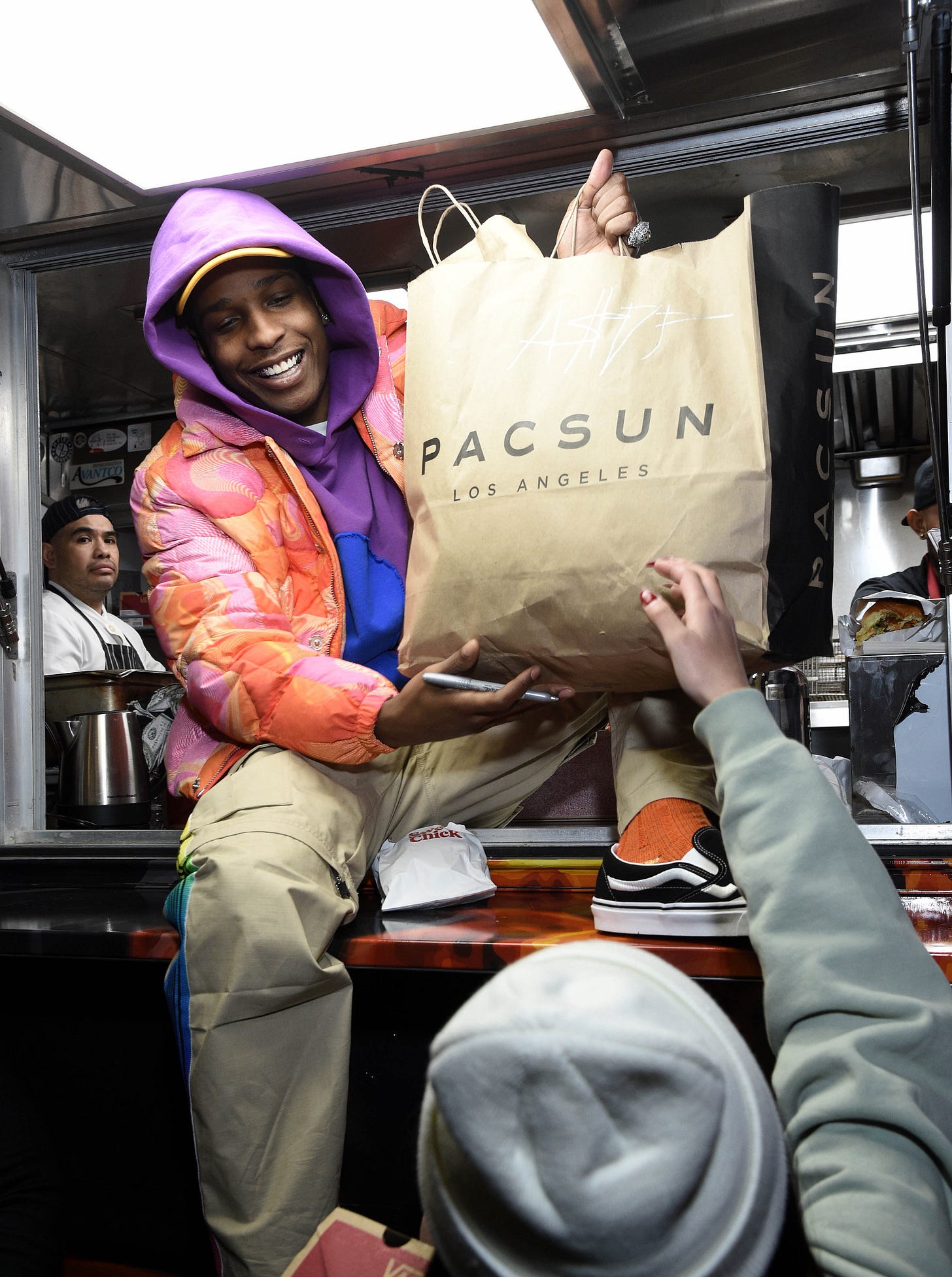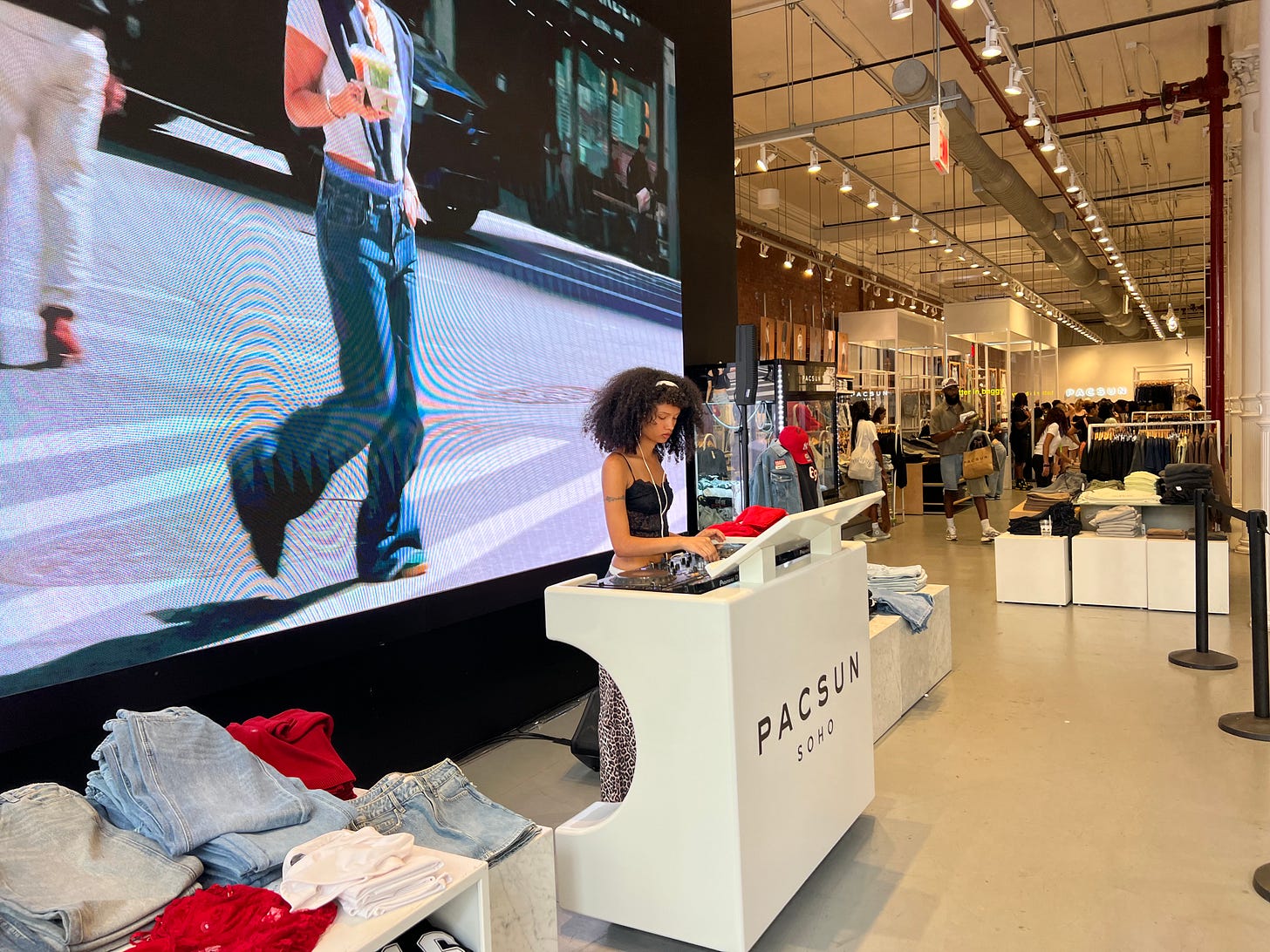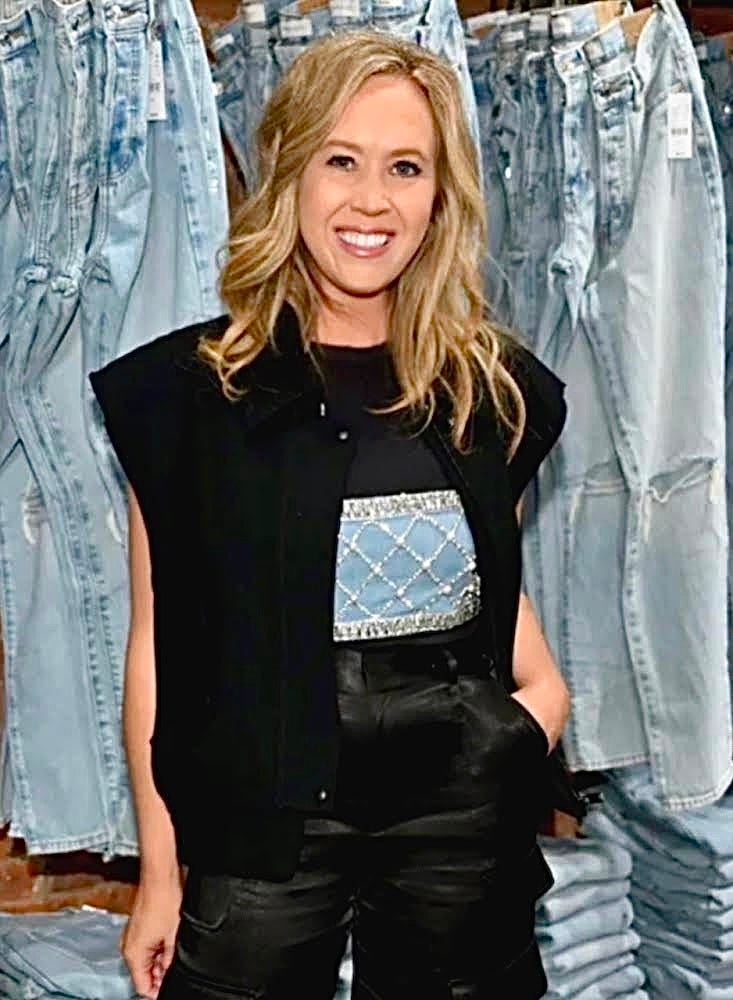Pacsun CEO Brieane Olson on how she's cracked the code on captivating Gen Z
Brieane Olson, CEO of Pacsun, is courting GenZers in all the right ways.
Pacsun, with reported annual sales of about $900 million and more than 300 stores nationwide and online, is among a handful of trendy fashion retailers that’s consistently breaking through to teens and young adults and earning their loyalty as one of the their favorite brands.
It’s not an easy task. Millennials and Gen Z – Pacsun’s clientele – are more deliberate shoppers than previous generations in deciding where to shop, what to buy and how much to pay for it. Yet, they’re also heavily guided by the whims of social media influencers.
But Olson, who became sole CEO of Pacsun (formerly known as Pacific Sunwear of California, a go-to seller of Cali-chic) in 2023 after a nearly two decades-long career with the company, has seemingly cracked the code on how to keep customers coming back for more. She’s evolved Pacsun to meet young shoppers where they are through constant innovation, creative marketing and bold collaborations.
“Pacsun has created a strong Gen Z community, which is helping to shape the business and its products and selling methods,” said Neil Saunders, retail analyst and managing director at Globaldata Retail.
Under Olson, Pacsun was one of the first fashion clothing chains to accept cryptocurrencies as payment options. The retailer opened a virtual mall on the global gaming platform phenomenon, Roblox, and made The Metropolitan Museum of Art “cool” to GenZers through its exclusive clothing collections depicting famous works of arts.
Pacsun also signed on A$AP Rocky to roll out an exclusive collection in his role as the first-ever guest artistic director for the brand. Just this month, Paris Hilton debuted an exclusive collection with Pacsun that dropped on the same day as her new album.
Pacsun is already buzzworthy. Now Olson, one of only a handful of female CEOs in retailing, wants the company to lead with a bigger purpose.
Below is the Q&A (edited for length and clarity) with Olson, who sat down with me to discuss Pacsun’s evolution, AI, turning customers into cocreators, baggy versus skinny jeans, and the need to give back:
Gen Z likes to shop at Pacsun, a lot. What’s the appeal?
Olson: Pacsun is in a very unique position, along with a handful of brands, that have that strong brand propensity and that consumers choose for distinct reasons.
We're a purpose and mission-based brand and we’ve evolved our mission at the core of why we exist to inspire the next generation of youth. We’re doing this through four pillars: fashion, of course, through sports, music and arts.

You can see this weaving through all of our very unique partnerships, whether it's Formula 1 in sports and our collaborations there which we launched three years ago and has been one of our top five brands, or The Metropolitan Museum of Art collections. We're in year three with The Metropolitan Museum of Art collaboration and it continues to build and the consumer is really eager to see the next drop and tie it back to each art collection in that drop.
Then there’s our exclusive UFC collaboration. When we did the popup for the launch in NYC in May, thousands of kids lined up to meet the UFC fighters. That’s the constant kind of innovation and creativity, with fashion woven in, with which we’re connecting with our consumers.
We’ve covered sports and art. What about the role of music in fashion? A$AP Rocky was Pacsun’s first-ever guest artistic director a few years ago. Is that an ongoing relationship?
Olson: It was disruptive in such a positive way. We had a two-year partnership with him and we enjoyed our time very much. Now he’s working with Puma, which is still a partner of Pacsun, so we still have opportunities and ways to connect with him.
Speaking of fashion and music, didn’t Paris Hilton drop by at the Pacsun flagship store in Soho in early September?
Olson: She came to the store and was committed to just swing by but she stayed for several hours. You know when I met her, she was doing all of the lobbying in Congress. And I think understanding how she's taking her story and being a force for good really tied back to what we stand for in inspiring the next generation of youth.

When Paris shared that her album would be about a celebration of ADHD, and it being her superpower and bringing that sentiment to all kids who might have something unique or different about them, it was something we really wanted to get behind. A lot of brands want to tell customers who they should be or what they're about. We’re really trying to lean in and co-create with the consumer.
You mean that quite literally. You recently launched Pacsun Collective, inviting Gen Z fans to create content, from merchandise to marketing campaigns. Why is this necessary?
Olson: One of the true blessings of engaging with a 16 to-24-year old is you get feedback all the time, good or bad. It’s through store visits, texts, they post about it, they write about you on Reddit. There's chat groups on Discord. I mean, it's so prevalent.
Even when they have critical feedback, it's absolutely the moment for a brand to engage and listen. That strong social listening is critical and key to our success. We have focus groups on a monthly basis. We engage with consumers across every social platform and we spend a lot of time in stores because I still think that that is such a quality touch point.
I'm really excited about our co-creation platform Pacsun Collective. It’s bringing more customers into the fold, not just from a product design perspective, but marketing, too. If you're an aspiring stylist or photographer, we have programs that are ongoing that include the consumer in our storytelling on a day-to-day basis.
We're looking to create more of that ongoing dialogue on our ecommerce site. That will be built next year where customers are welcome to design and vote, for example, on T -shirts, to be a part of it. This concept of community and co-creation in my opinion is in its infancy over the last two to three years and we really have an opportunity to scale it and amplify our customers’ voices.
What is your goal with all of these partnerships?
Olson: Brands have to take on so much more responsibility today to make sure that we're helping our youth succeed in meaningful ways.
When we look at our sports partnerships, for example, we look at a localized strategy and it all has to tie back to community and philanthropy. In our relationship with the Los Angeles Rams, which is in our fifth year now, we've donated $5 million in brand new clothing to inner city Inglewood schools at the elementary, middle school and high school level.
Speaking with the [school] superintendent, we learned that the number one reason for absenteeism there is that kids didn't have clean clothing to wear to school. We really want to create meaningful change in the community.
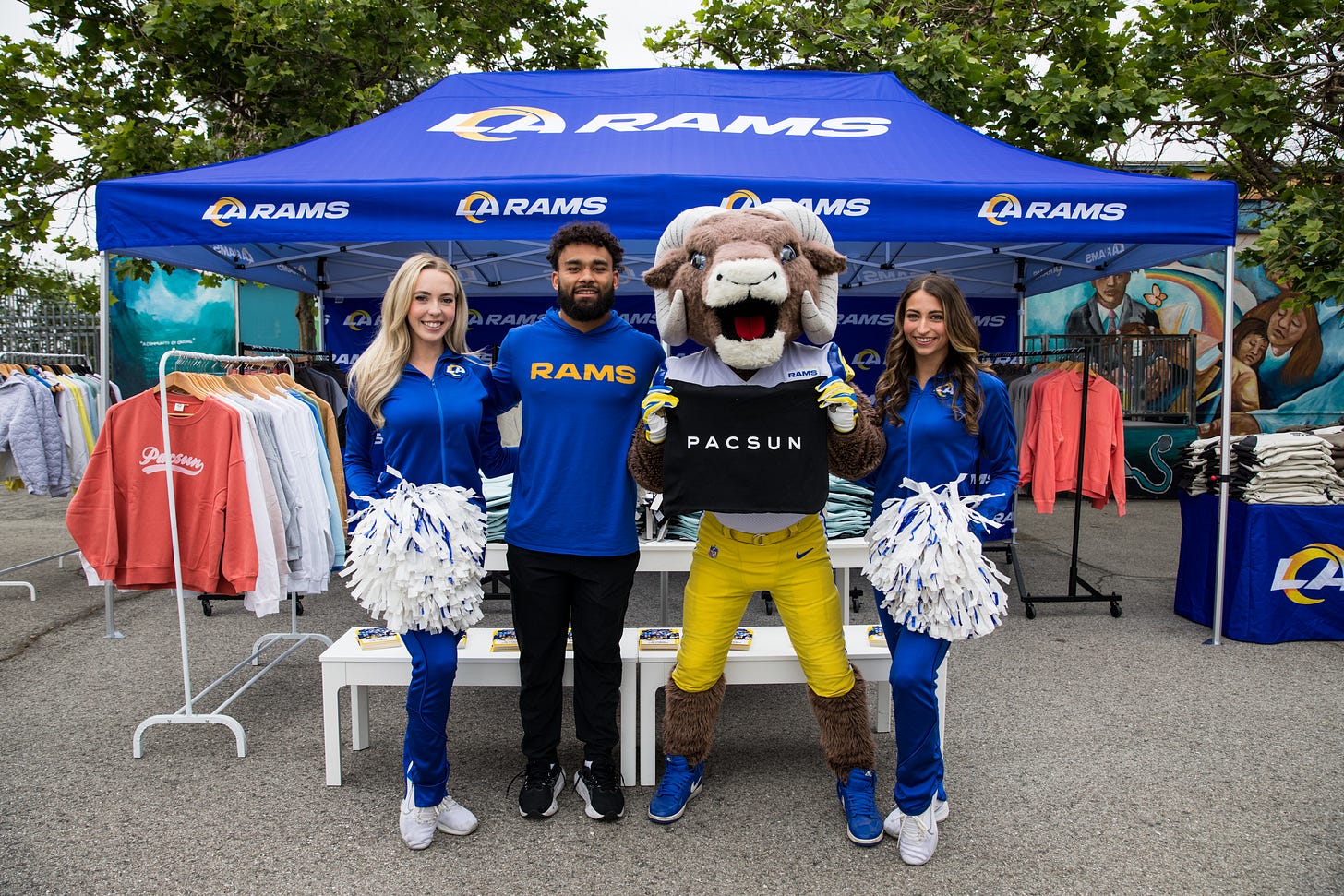
The superintendent told us that our clothing donations only resulted in two weeks of improvement because the kids didn't have a way to keep the clothing clean. So then we partnered with the Los Angeles Rams and put in washing machines and dryers in 13 local schools there and opened up access working with the schools for before-school and after-school [laundry] and that has meaningfully improved absenteeism.
In any sports partnership the first question is how are we going to show up in the community and do meaningful work? If it's just more of a sponsorship opportunity, it's a pass.
Let’s talk about artificial intelligence. Are you fully embracing AI at Pacsun or treading carefully?
Olson: We’ve been very thoughtful about AI. It's a game changer in terms of its potential. I would say the quickest wins for us with it have been with inventory management, planning and allocation, connecting with and managing our employees.
There's some initial exploration in trying to decide the customer journey and give more personalized options to the customers, but I would say the results there have been more mixed.
We’ve established an AI Council. It’s a group of 12 people that sit cross-functionally through the organization. We meet every Tuesday for an hour. My leadership team has a mandate of at least 10 hours of AI per week to understand how to better use it as your coach or use it as an amplification of the work that we're doing so it's doing busy work in the background.
We also set up an 18-month roadmap and we're looking at AI and we have things in motion across every channel. The areas that I'm most hesitant to explore [with AI] are probably the ones that touch the customer more directly. AI is really smart, but it will never replace that human touch.
With product design and development, we're very cautious because there's a lot of brands out there that are using AI, but then there's a lot of likeness or sameness that's created as a subset of this as these brands are training the module. Pacsun is known for its very unique products.
Pacsun’s shoppers are digital natives but they also like to hang out and shop in malls. Will Pacsun expand through more stores or through social commerce?
When I think about the next three to five years, I'm very excited about the prospect of going global. And you’ll start to see us open stores.
We’re also keeping up with how social commerce will continue to evolve. We started with livestream selling in 2019 on our own website. This past November we sold 7,000 pairs of denim in a 48-hour time period from creator livestream on TikTok. You can definitely feel that there is a lot of movement with the consumer right now.
We’re continuing to understand how that will continue to shift and compliment what the customer currently sees in the digital experience and the store experience. For a brand like Pacsun, that's tremendously helpful in terms of amplification of our story.
As one of only a handful of female CEOs in retailing, what are some lessons you’ve learned about what it takes to sustain a long and successful career?
Olson: The truth is even when I reflect back on it, some of my favorite memories from my career are still working in stores. There's such a joy connecting with consumers. It actually gives back so much when you're able to help them with their self-expression or you're able to boost someone's confidence.
Even as I look towards what could be later in my career, I'll probably end up back in stores. I really love it. I love the industry, I love our customer. The 16 to 24-year-olds, they keep you on your toes. So every day feels very different and you get the opportunity to meet the customers where they are and kind of reinvent the [shopping] experience.
When someone's picking their career path, they should do what they love. I've always loved fashion as a form of self -expression. I have always been very connected to the youth. I care very much about the future generation and creating a sense of community.
I think the community and philanthropy work that we've been able to weave through our work ends up being very rewarding. With Selena Gomez, we're working with her Rare Impact Fund addressing mental health. That's such a pressing issue. The kids are the most generous with donations. We're less than halfway through the year and we have a $1 million of roundup donations at checkout from our consumer to the mental health fund.
The best advice I can give is to do what you love and to always stay very curious.
Now, the most important question: Baggy jeans or skinny jeans in 2025?
Olson: Pacsun has always been known for denim. I think that we're gaining share [in denim] because we’ve held prices steady. But it’s ultimately the customer who tells us what’s next.
If you look historically at the footwear cycle in which sneakers are trending, it's very interesting to see the correlation. As you go into slimmer silhouettes in the sneakers, then it will probably bring forward new silhouettes in jeans.
What we're learning right now in a very small way in terms of incubation is that there's interest in bootcut.
Will slimmer denim silhouettes be reintroduced? Absolutely. But the timing will be determined by the customer and Pacsun will be ready for it.
This is no different than watching the skinny jean trend or the jegging trend or the flared jeans trend. We took some bets on baggy denim this year and it paid off very well. We saw it incubating over two to three years and Pacsun was definitely at the forefront of that.



